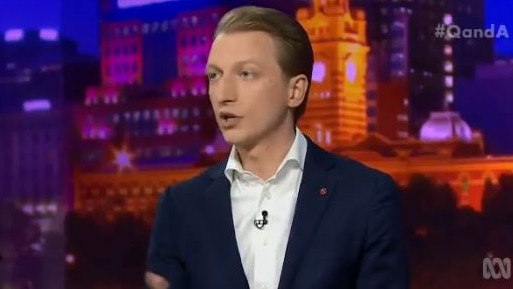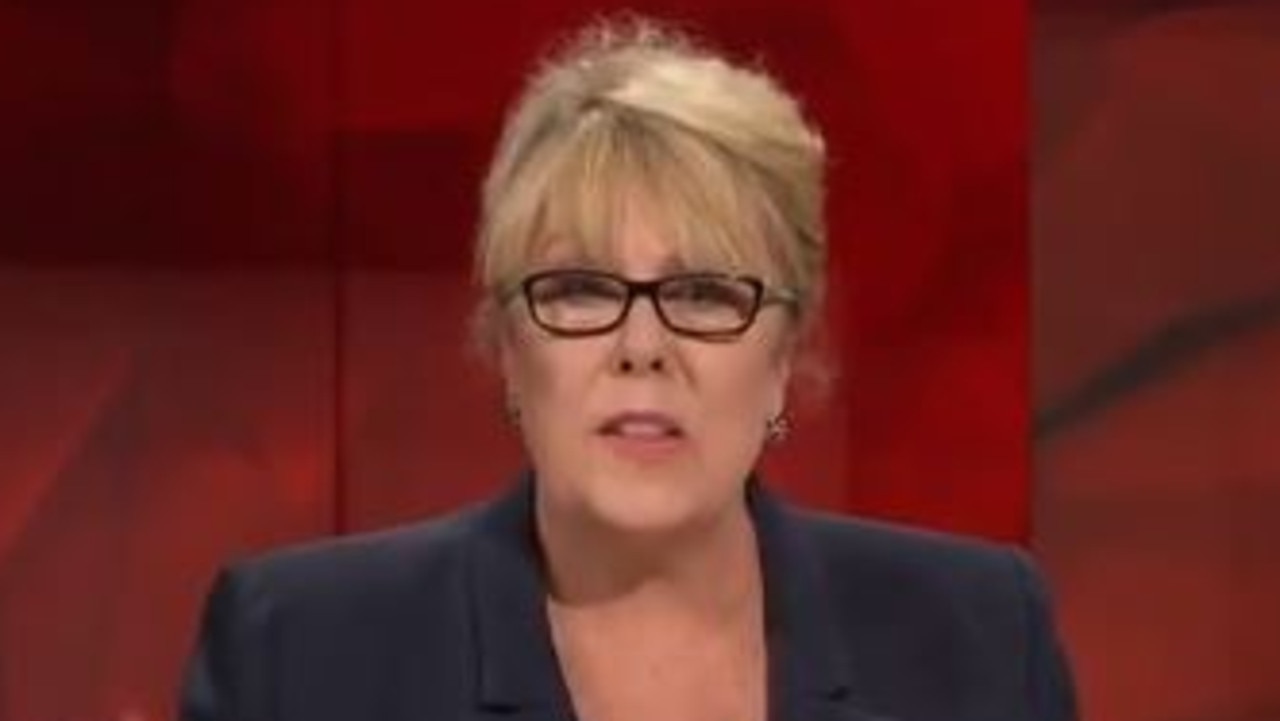Q&A recap: James Paterson accused of being a ‘glib sloganeer’ by Jeffrey Sachs
James Patterson and Jeffrey Sachs sparred over climate change, foreign aid and welfare in a heated episode of Q&A.

Victorian senator James Paterson has been accused of being a ‘glib sloganeer’ by world-renowned professor of economics Jeffrey Sachs, in a heated discussion where the two sparred over climate change, foreign aid and welfare.
Appearing on ABC’s Q&A last night, the senator and the leader in sustainable development were also joined on the panel by Labor MP for Griffith Terri Butler, visiting columnist for the British-based The Telegraph James Bartholomew, and ‘peoples panellist’ Linda McIver, a former high school teacher and founder of the Australian Data Science Education Institute.
On the topic of Australia’s foreign aid, Professor Sachs, who is based in the US, said it was a “terrible blow for the world” that the budget had been decreased to just 0.22% of GDP.
“When countries as rich and talented and stable and well off as this country don’t fulfil the global responsibility of at least 0.7% of GDP in development aid, it’s a terrible blow.
“If we all did it we would save millions of lives, we would have all the kids in school. They would be growing up to be productive members of their society, we wouldn’t have the mass refugee movements. We would have a completely different dynamic in the world,” he said.
.@JeffDSachs takes @SenPaterson to task on sloganeering and foreign aid #QandA pic.twitter.com/KGbqWiyB8a
— ABC Q&A (@QandA) October 15, 2018
Senator Paterson responded to Professor Sachs by saying that “entrepreneurial capitalism has reduced poverty more than foreign aid ever will”.
“It’s the rule of law, secure property rights, free trade and economic freedom. If we saw those institutions embraced on a worldwide scale, we could have a much more profound impact on poverty,” he said.
Professor Sachs fired back at Mr Paterson, saying: “It’s fine entrepreneurship, everything else, but let’s not sloganeer when the question is getting kids in school, getting basic healthcare,
“What you’re talking about is not going to those kids next year, so you’ve got to get real and what you’re saying is a slogan.
“I have helped … a massive decline of poverty on the same side as you, helping to get markets to work, helping to get trade to work, helping to get people to work but also helping to stop diseases and helping to get children in school.
“And if you do any professional work on actual budgeting, then I would tell you what you’re saying is a glib slogan. Not a reality about what development aid is about.”
The professor, who worked on a blueprint towards ending global poverty, called Australia a “rich, wonderful, beautiful country that can afford to do more”.
CLIMATE CHANGE
Asked about climate action, Professor Sachs scorned both the Australian and US governments as “unbelievably irresponsible to you and to all of the world” for what he called inaction on climate change.
When will governments across the world start making our environment a priority? @JeffDSachs responds #QandA pic.twitter.com/wPpcKt0hl0
— ABC Q&A (@QandA) October 15, 2018
He also criticised “corruption” between politicians and “big oil and big coal” companies as being responsible for current climate policies in the US and Australia, and said this was causing a “breakdown of the democratic process”.
“Think of what’s happening in this country, is this in the interests of Australia, that you have the heatwaves, that you have the droughts … of course not.”
He urged the government to “make a plan, make a timeline, tell the world how you’re going to decarbonise. And then we’ll all be happy to hear from Australia that there’s really a plan.
“All we see is one prime minister after another falling over this issue. But we don’t see any action.”
Senator Paterson responded by saying that Australia’s emissions make up “about 1% of global emissions”.
“If you shut Australian industry and jobs down tomorrow it would make no difference to the global climate,” he said.
.@SenPaterson on the issues of environmental objectives against rising power bills #QandA pic.twitter.com/hTVBcckQsl
— ABC Q&A (@QandA) October 15, 2018
Terri Butler called for a “return to bipartisanship” on the issue of climate change.
“We had it when John Howard introduced the renewable energy target, we had some bipartisanship and then things went terribly, terribly wrong,” she said.
James Bartholomew argued mainstream global warming predictions were too extreme in the rate of warming that they predicted, instead believing that a “global lukewarming” was more accurate.
He also said that scientists who have a different view of the rate of warming suffer from “no platforming” in the climate change debate.
WELFARE
On a question of preventing welfare and entitlements undermining economic growth, Mr Bartholomew said “welfare dependency has had a tendency to increase an expectation of a sense of entitlement, a sense that … some people … are discouraged from working who otherwise would be working”.
How do we stop welfare and entitlement undermining economic growth? @JGBartholomew #QandA pic.twitter.com/wA7grG3SYZ
— ABC Q&A (@QandA) October 15, 2018
“When they’re unemployed this is extremely damaging to their mentality. They are more likely to commit suicide. More likely to be alcoholic. They’re more likely to be self-harming and so on and so forth. The welfare state in many countries … has led to an increase in lone parenting which has resulted in a greater number of children who have the disadvantages of this and it’s also damaging to the women concerned.
“And I believe it’s damaging to the men who are not in a married state as well. All these
parties are damaged … they’re de-familised.
“The state subsidised things which result in people having less sense of responsibility, and less sense of duty and honour and family and these, I believe, are part of a whole range of ways in which welfare states have damaged people.
People’s panellist Lina McIver responded that “as a data scientist, I have to take issue with some of the cause and effect relationships that you have claimed there.
“The idea that the welfare state causes single-parent families I think is utterly unsupported by the data. If you know of data I’d love to see it.
“You’re drawing relationships out of an ideology.”
.@JeffDSachs on the correlation between happiness and social welfare #QandA pic.twitter.com/WqkGk8qyM3
— ABC Q&A (@QandA) October 15, 2018
Professor Sachs also criticised Mr Bartholomew’s views on welfare, saying that the idea that welfare takes away an incentive to work “is actually the opposite”.
“The countries (that top the World Happiness Report) every year — Norway, Sweden, Denmark, Netherlands, Germany — are the countries with the largest so-called social welfare states.
“They are the most prosperous. They have the best social conditions. They report the highest quality of life. They enjoy their lives. They have a degree of equality that is unmatched in other parts of the world.
“Labour force participation of women is the highest in those countries. Why? Because the social welfare state also means that there’s childcare available, that there is maternity leave for the first nine months or 12 months to a mother raising a new child. And father’s leave. But after that there is enough support that a mother can go to work and people do want to go to work.
“I happen to live in a country that doesn’t believe it. We soaked up the libertarian ideas. I can tell you what it’s like. We have a large part of our population living in duress. We have a large part of our population living in extreme poverty in the US. It’s horrible.”
Ms Butler said Australia had a “well-targeted” welfare spend.
“The largest component of our welfare budget is the aged pension. I don’t think people begrudge people who have worked hard their entire life, and have now retired, a payment of the aged pension.
“We want to ask ourselves who we are as a country. When we talk about cutting welfare, there’s a human face to everyone who requires some assistance from the state.
“We have to just admit we don’t have full employment in Australia and not everyone has full capacity. And a modern nation, a nation that looks after its people, will fill in the gaps,” she said.




To join the conversation, please log in. Don't have an account? Register
Join the conversation, you are commenting as Logout